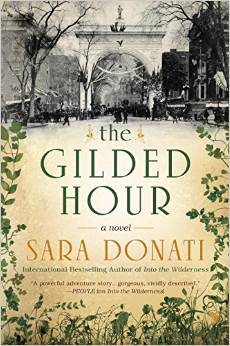 About the Book
About the Book
The year is 1883, and in New York City, it’s a time of dizzying splendor, crushing poverty, and tremendous change. With the gravity-defying Brooklyn Bridge nearly complete and New York in the grips of anti-vice crusader Anthony Comstock, Anna Savard and her cousin Sophie—both graduates of the Woman’s Medical School—treat the city’s most vulnerable, even if doing so may put everything they’ve strived for in jeopardy.
Anna’s work has placed her in the path of four children who have lost everything, just as she herself once had. Faced with their helplessness, Anna must make an unexpected choice between holding on to the pain of her past and letting love into her life.
For Sophie, an obstetrician and the orphaned daughter of free people of color, helping a desperate young mother forces her to grapple with the oath she took as a doctor—and thrusts her and Anna into the orbit of Anthony Comstock, a dangerous man who considers himself the enemy of everything indecent and of anyone who dares to defy him.
732 pages (hardcover)
Published on September 1, 2015
Published by Berkley
Author’s webpage
Buy the book
—
Typically, I reserve this website for fantasy and science fiction book reviews. Occasionally a different sort of book will strike my hard enough that I’ll find it necessary to veer off the path and talk about something a bit different. Consider this one of those times. This book is not fantasy or science fiction. It’s historical fiction. If that sort of thing doesn’t interest you, then feel free to skip over this review.
The Gilded Hour is a historical fiction taking place in the late 1800’s in New York City. This book mostly follows Anna, a female surgeon, though occasionally we get a few other perspectives in there, as well. Most notably is Sophie, Anna’s cousin who is a practicing obstetrician, an orphaned daughter of free people of color. So you see this setup, and you can probably instantly see that this book is a horse of a different color. These are female doctors in an age where female doctors weren’t really a thing. One of these doctors happens to be a woman of color, and both of them are headstrong, opinionated, and educated, and often working with the vulnerable classes of New York City – the poor, destitute, and orphaned.
The Gilded Hour isn’t just a fantastic story with some incredibly strong, insanely memorable protagonists. This book is superbly researched and really gives readers an insight into the time, the social issues that plagued society, and the struggle (often hidden behind closed doors) that women faced, as well as the fallout from various laws that were passed at the time (like the Comstock Laws).
I was completely captivated from the get-go, and I was profoundly moved by this book and everything that it boldly covered. It was a dirty, gritty time where medical science had evolved but due to laws and social mores, much of what was understood couldn’t be acted on without doctors and nurses going to jail for it. It was a time when there were so many orphans that the city really had no idea what to do with them all. It was messy, chaotic, often heartbreaking, and oddly enough, it’s a social commentary that I think is absolutely vital to give many of us a perspective on some of the debates (political and otherwise) that we are facing in our society today.
The writing is superb, and there was never a moment when I doubted anyone’s motivation in regards to anything they did. My one regret was that Sophie didn’t get more limelight, as her story being a woman of color and a doctor besides, was quite fascinating. I would have liked to know more about her. But Anna’s story was incredibly well done, and her narrative wove neatly through New York, tying together all sorts of people that I never expected to really see tied together. She’s a woman of (fairly) upper class means, educated, and spends most of her time working with the poor and destitute. She sees just about everything, and there is no room for her to be timid, because she has to assert herself constantly. She’s a firebrand in an age where fires seemed to be dampened by so many laws and customs.
There are quite a few plots going on in these pages. We have the plight of the orphans, whom Anna and Jack are trying to find and reunite into a family unit. This takes them through just about every poor house and orphan establishment in the city. There’s the baby that Sophie delivers at the start of the novel that spirals into this huge plot involving the Comstock Laws, civil rights, women’s rights, abortion and just about everything else. There’s a whole lot of oppression, and a whole lot of danger, and a lot of silent struggles that I think many of us have forgotten about, but have absolutely shaped much of the social/political landscape that makes up this nation.
Interspersed with all this darkness and deep situations, there is plenty of light. People fall in love. Family units are created. Friendships formed, and people are reunited. That’s probably part of what makes this book work so well. It can be dark and broody and full of worry, but it’s also woven so tightly with so many brilliant, beautiful moments. It’s hard to let any part of this book, or its weighty topics, overwhelm you because Donati seems to know how to strike the perfect balance.
But oh, this novel is poignant for our time. We’ve come so far, but we have so far left to go.
Read this book.
5/5 stars
0 Comments